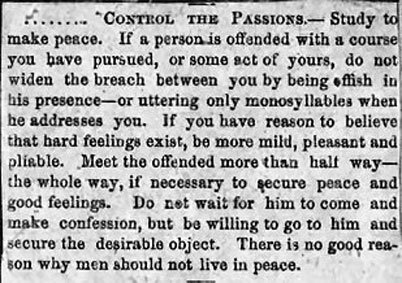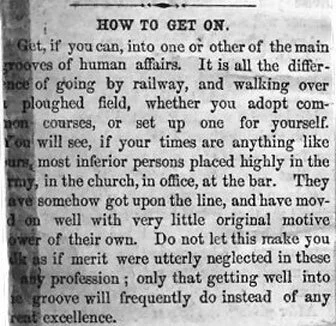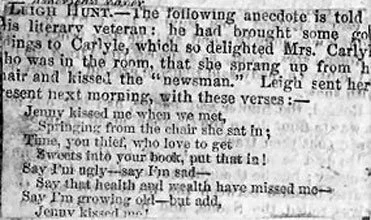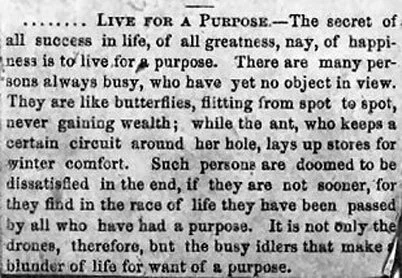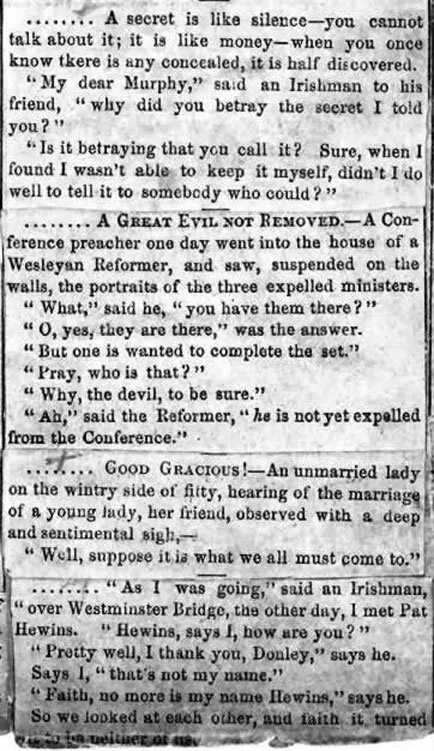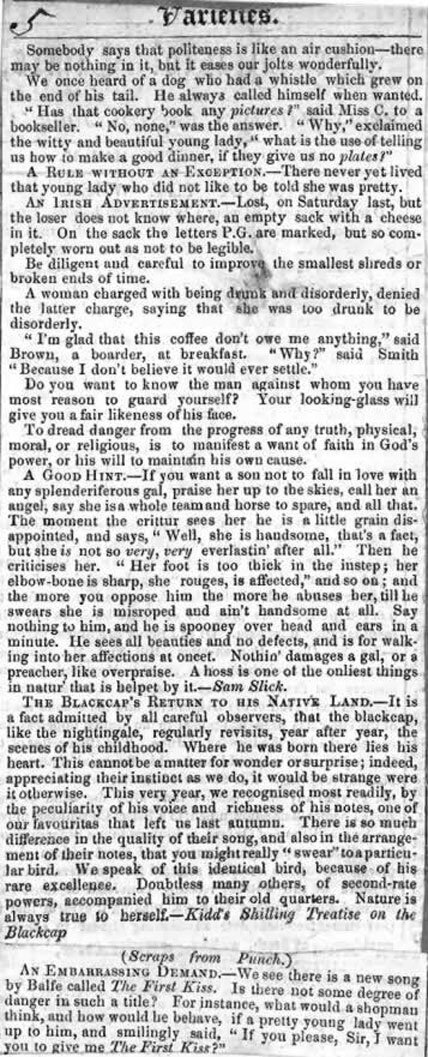A CHARITABLE MAN
Rev. my gins said:-
“I am a charitable man, and think every one is entitled to his opinion – and never cherish nothing against my foes, not even against Mr. Mulberry who has indirectly called me a sinner; but, still, if the Lord has a thunderbolt to spare, I think it would be very well bestowed upon dear Brother Mulberry’s head.”
…. Tears do not always flow from a broken and grief-stricken heart, even when they have the appearance of doing so; for instance, read what Tom Hood says on the matter: -
“After such years of dissension and strife,
Some wonder that Pete should weep for his wife.
But his tears on her grave gave are nothing surprising.
He’s laying her dust for fear of it rising.”
A GEM
There is much sound philosophy in the following brief extract from an editorial in the New York Tribune:
“Life is short; and that portion of it which one human being devotes to injuring, punishing and destroying another, we are inclined to think will pay but a poor dividend on the final settlement of difficulties.”
A RECEIPT FOR HAPPINESS
When you rise in the morning form a resolution to make the day a happy one to a fellow creature. It is easily done; trifles in themselves light as air will do it, at least for the twenty-four hours. By the most simple arithmetical sum, look at the result; you send one person, only one, happily through the day; that it three hundred and sixty-five in the course of the year; and, supposing you live forty years only after you commence that course of medicine, you have made 14,600 human being beings happy, at all events for a time. Now, worthy reader, is this not simple? It is too short for a sermon, too homely for ethics, and too easily accomplished for you to say, “I would if I could.” –
Sydney.
An Advert in a Bristol Newspaper
To pass a pleasant hour in winter evenings, nothing is so enjoyable as a game of bagatelle. The boards can be had any size, at a moderate price, from U, Alsop, House Furnisher, Broadmead..
“BELLE BRITTAN,”
of the Mirror, writes that there was a superb-looking lady from New Orleans, at a late Newport “hop,” “ who wore a bouquet of diamonds, pearls, and precious stones, which was said to have cost twenty thousand dollars!”
Reference to Belle Brittan’s visit to Newport September 4, 1858
DISCRETION
has large and extended views, and, like a well-formed eye, commands a whole horizon.
“COME till America, Pat!” writes a son of the Emerald Isle, to his friend in Ireland. “’Tis a fine county to get a living in. All ye have to do is to get a three-cornered box, and fill it wid bricks, and carry it till the top of a four-storey building, and the man at the top does all the work.”
CONTROL THE PASSIONS
Study to make peace. If a person is offended with a course you have pursued, or some act of yours, do not widen the breach between you by being offish in his presence – or uttering only monosy liable when he addresses you. If you have reason to believe that hard feelings exist, be more mild, pleasant and pliable. Meet the offended more than half way – the whole way, if necessary to secure peace and good feelings. Do not wait for him to come and make confession, but be willing to go to him and secure the desirable object. There is no good reason why men should not live in peace.
…. Fanny Horton, a celebrated English actress, being hissed in her youth, had the boldness to come before the audience and ask, “Which do you dislike, my playing or my person?” “The playing! The playing!” was the cry from all sides. “Well, that consoles me,” was the answer; “my playing may be bettered, but my person I cannot alter.” She soon became the favourite of the public.
FRIENDSHIP SELF-LOVE IN DISGUISE
The most generous and disinterested friendship must be resolved at last into the love or ourselves; he therefore whose reputation or dignity inclines us to consider his esteem as a testimonial of desert, will always find our hearts open to his endearments.
GEMS OF THOUGHT
FROM TURNED-DOWN LEAVES IN OUR READING.
EDUCATION begins the gentleman; but reading, good company, and observation must finish him.
The certain way to be cheated is to fancy oneself more cunning than others.
He who can conceal his joys is greater than he who can hide his griefs.
He is the best accountant who can cast up correctly a sum of his own errors.
Old age has deformities enough of its own; do not add to it the deformity of vice.
Every base occupation makes one sharp in its practice, and dull in every other.
Fire and sword are but slow engines of destruction in comparison with the babbler.
The Bible is a window in this prison of hope, through which we look into eternity.
Next to acquiring good friends, the best acquisition it that of good books.
HOW TO GET ON
Get, if you can, into one or other of the main grooves of human affairs. It is all the difference of going by railway, and walking over a ploughed field, whether you adopt common courses, or set up one for yourself. You will see, if your times are anything like ours, most inferior person persons placed highly in the army, in the church, in office, at the bar. They have somehow got upon the line, and have moved on well with very little original motive power of their own. Do not let this make you walk as if merit were utterly neglected in these or any profession; only that getting well into the groove will frequently do instead of any great excellence.
IKE HEARD FROM
– Mrs. Partington discourseth concerning Ike: - “Betsy Jane writ to you about poor Isaac bein’ grafted into our noble army; it was during the late prevailing restriction. I’ve been so dreadful uneasy, laws a me! But, Dan’ I, at last we’ve heard of him by a neighbour who is home on a furrow. He – poor innocent! at on’st took his place, so neighbour Tibbins says, as first corpulent, and soon proved so deficient that he was promoted to be an ordinary surgeon – poor child! But what the blessed dear knows about taking up arterials and computation of lims, and the like, surpasses me. Howsumever, if he can be the humble implement in the hands of the Lord of saving the lives of the gallus fellows, whose heads have been disseminated by the bursting open of pontoons and thing, why, we must sacrifice him freely, and may the Lord have mercy on his solar system.”
A rough translation into modern English: -
IKE HEARD FROM. – Mrs. Partington discourse concerning Ike: - “Betsy Jane wrote to you about poor Isaac being drafted into our noble army; it was during the late prevailing conscription. I’ve been so dreadful uneasy, I have! But, Darn it, at last we’ve heard of him by a neighbour who is home on a furrow (farm). He – poor lad! At once took his place, so neighbour Tibbins says, as first a Corporal, and soon proved so deficient that he was promoted to be an ordinary surgeon – poor child! But what does the blessed dear know about taking out arteries and amputation of limbs, and the like, surpasses me. Howsoever, if he can be the humble implement in the hands of the Lord of saving the lives of the gallant fellows, whose heads have been disfigured etc., why, we must sacrifice him freely, and may the Lord have mercy on his soul.”
IMPROVE YOUR MOMENTS
Many people are in the habit of mourning over their ignorance and complaining because they have no opportunities for study. If they would spend the time which is consumed in making these complaints, in studying useful books, they might become comparatively well educated. One of the best informed men we ever knew was a mechanic, who had devoted only twenty minutes a day to study, and had reflected over his reading, as he best could, while working at his trade. Any person who really wants to become well informed, will gain his wished, no matter what difficulties may beset his path; while those who only desire to clutch the honors which learning gives, but care nothing for knowledge itself, will remain in ignorance, though surrounded with abundant helps to education.
INDIVIDUAL vs. JOINT ACTION
We seldom in life find ourselves more unpleasantly situated than when, as is often the case, our fate and happiness are staked upon an enterprise in which many other persons are joined, whose errors or negligences counteract all our best endeavors, and whose conduct, however much we may disapprove it, we cannot command.
LEIGH HUNT
The following anecdote is told is his literary veteran: he had brought some gold earrings to Carlyle, which so delighted Mrs. Carlyle who was in the room, that she sprang up from her chair and kissed the “newsman.” Leigh sent her a present next morning, with these verses: -
Jenny kissed me when we met,
Springing from the chair she sat in;
Tune, you thief, who love to get
Sweets into your book, put that in!
Say I’m ugly – say I’m sad –
Say that health and wealth have missed me –
Say I’m growing old – but add,
Jenny kissed me!
LIVE FOR A PURPOSE
The secret of all success in life, of all greatness, nay, of happiness is to live for a purpose. There are many persons always busy, who have yet no object in view. They are like butterflies, flitting from spot to spot, never gaining wealth; while the ant, who keeps a certain circuit around her hole, lays up stores for winter comfort. Such persons are doomed to be dissatisfied in the end, if they are not sooner, for they find in the race of life they have been passed by all who have had a purpose. It is not only the drones, therefore, but the busy idlers that make a blunder of life for want of a purpose.
“LOOK HERE , JIM,”
said a young fellow the other evening to an old soaker who had evidently taken too deep an interest in spiritual matter, and was still, with the peculiar obstinacy of those in his condition, vociferating for another “smile.” “Look-a-here, old fellow, you’ll spoil your constitution by this style of thing – better hold up.” “Constitution be blowed!” said the old fellow, “I broke that long ago! Been living on the bylaws these six months!”
…. We are apt to mistake our vocation in looking out of the way for occasions to exercise great and rare virtues, and stopping over the ordinary ones which lie directly in the road before us. When we read we fancy we could be martyrs; when we come to act, we find we cannot bear a provoking word.
NEAR HOME
One should go to sleep at night as homesick passenger do, saying, “Perhaps in the morning we shall see the shore.” To us who are Christians, it is not a solemn, but a delightful though, that perhaps nothing but the opaque bodily eye prevents us from not holding the gate which is open just before us, and nothing but the dull ear prevents us from hearing the ringing of those bells of joy which welcome us to the heavenly land. That we are so near death, is too good to be believed: -
PRIDE AND VANITY
The virtues are economists, but some of the vices are also. Thus, next to humility, I have noticed that pride is a pretty good husband. Price is handsome, economical; pride eradicates so many vices, letting none subsist but itself, that it seems as if it were a great gain to exchange vanity for pride. Pride can go without domestics, without fine clothes, can live in a house with two rooms, can eat potatoes, purselane, beans, lyed corn, can work on the soil, can travel afoot, can talk with poor men, or sit silent well contented in fine saloons. But vanity costs money, labour, horses, men, women, health, and peace, and it still nothing at last, a long way leading nowhere. Only one drawback; proud people are intolerably selfish, and the vain are gentle and giving. –
Emerson’s Conduct of Life.
RELATIONSHIP, OR BLOOD
The closest of all blood relationships is that of the mother and child, and it constitutes the very best example that we can select to examine the security which blood provides as a basis of relationship. The spiritual feelings originating in this relationship are very powerful. Nothing can exceed the love of a mother; it will make greater sacrifices than any other passion; it will sacrifice truth itself and justice – anything. The advocacy of a mother defies all opposition and all arguments.
SMALL TALK
Nobody abuses small talk unless he be a stranger to its convenience. Small talk is the small change of life: there is no getting on without it. There are times when “’tis folly to be wise,” when a little nonsense is very palatable, and when gravity and sedateness ought to be kicked downstairs. A philosopher cuts a poor figure in a ball-room, unless he save his wisdom at home. metaphysics is as intrusive in the midst of agreeable prattle, as a death’s head on a festal board. We have met with men who were too Lofty for small talk; who would never swear at their servants or – the weather. They would never condescend to play with a ribbon or flirt a fan. They were above such trifling: in other words, they were above making themselves agreeable, above pleasing, and above being pleased. They were all wisdom, all gravity, and all dignity, and all tediousness, which they bestowed upon company with more the Dogberry’s generosity. A man who cannot talk has no more business in society than a stature. The world is made up of trifles, and he who can trifle elegantly and gracefully is a valuable acquisition to mankind. He is a Corinthian column in the fabric of society.
THE BODY AVENGED
By too much sitting still the body becomes unhealthy, and soon the mind. This is Nature’s law. She will never see her children wronged. If the mind, which rules the body, ever forgets itself so far as to trample upon its slave, the slave is never generous enough to forgive this injury; but will rise and smite its oppressor. Thus has many a monarch mind been dethroned. –
AN AFFAIR OF IMPORTANCE
Harriet: “Oh! I’m so glad you are come, Blanche! I have been so perplexed I could hardly sleep all night.”
Blanche: “Well! What is it, dear?”
Harriet: “Why, I don’t know whether to have my newmerinofrock violet or dark blue!” -
The common fluency of speech in many men and most women, is owing to a scarcity of matter, and a scarcity of words, for whoever is master of language and has a mind full of ideas, will be apt in speaking to hesitate upon the choice of both; whereas common speakers have only one set of ideas, and one set of words to clothe them in; and these are always ready at the mouth; so people come faster our of a church when it is almost empty, then when a crowd is at the door.
THE DEITY OF INFANCY
As the infant begins to discriminate between the objects around, it soon discovers one countenance that ever smiles upon it with peculiar benignity. When it wakes from its sleep, there is one watchful form ever bent over its cradle. If startled by some unhappy dream, a guardian angel seems ever ready to soothe its fears. If cold, that ministering spirit brings it warmth; if hungry, she feeds it; if in pain, she relieves it; if happy, she caresses it. In joy or sorrow, in wed or woe, she is the first object of its thoughts. Her presence is its heaven. The mother is the deity of infancy.
The greater the difficulty, the more glory is there surrounding it. Skilful pilots gain their reputation from storms and tempests.
He who troubles himself more than he needs, grieves also more than is necessary, for the same weakness which makes him anticipate his misery, makes him enlarge it too.
Words are little things, but they strike hard. We wield them so easily that we are apt to forget their hidden power. Fitly spoken, they fall like the sunshine, the dew, and drizzling rain – but when unfitly, like the frost, the hail, and the desolate tempest.
A SIMILE may be bright while the heart is sad: the rainbow is beautiful in the air while beneath is the moaning of the sea.
The heart of women is her destiny, for it is rarely that it is not her guide; but it is a guide that should be enlightened by reason.
A CONTENTED MIND
It must be the change of the mind, not of the climate or place, that will remove the heaviness of the heart. Our vices go with us, and the cause of our disquiet is in ourselves; changing of countries in this case is not travelling, but wandering. He that cannot live happily anywhere will live happily nowhere. What are you the better for travelling, as if your cares could not find you. Wherever you go? There is no retiring from the fear of death, or those difficulties which beset a man, wherever he is.
…. A Secret is Like Silence
– you cannot talk about it; it is like money – when you once know there is any concealed, it is half discovered.
“My dear Murphy,” said an Irishman to his friend, “why did you betray the secret I told you?”
“Is it betraying that you call it? Sure, when I found I wasn’t able to keep it myself, didn’t I do well to tell it to somebody who could?”
…. A GREAT EVIL NOT REMOVED.
- A conference preacher one day went into the house of a Wesleyan Reformer, and saw, suspended on the walls, the portraits of the three expelled ministers.
“What,” said he, “you have them there?”
“O, yes, they are there,” was the answer.
“But one is wanted to complete the set.”
“Pray, who it that?”
“Why, the devil, to be sure.”
“Ah,” said the Reformer, “he is not yet expelled from the Conference.”
…. GOOD GRACIOUS!
– An unmarried lady on the wintry side of fifty, hearing of the marriage of a young lady, her friend, observed with a deep and sentimental sigh, -
“Well, suppose it is what we all must come to.”
“As I Was Going”
….“As I was going,” said an Irishman, “over Westminster Bridge, the other day, I met Pat Hewins.”
“Hewins,” says I, “How are you?”
“Pretty well, I thank you, Donley,” says he.
Says I, “that’s not my name.”
“Faith, no more is my name Hewins,” says he.
So we looked at each other, and faith it turned out to be neither of us.
Legal Advice From Lawyer to His Son
“My son,” said an old lawyer, giving advice to his son, who was just entering upon the practice of his father’s profession,
“if you have a case where the law is clearly on your side, but justice seems to be against you, urge upon the jury the vast importance of sustaining the law.
If, on the other hand, you are in doubt about the law, but your client’s case is clearly founded in justice, insist on the necessity of doing justice, though the heavens fall.” –
“But,” asked the son, “how shall I manage a case where both law and justice are dead against me?” –
“In that case, my son,” replied the old stager, “talk round it!”
Canadian Magistrate Acting as Judge & Jury in His Own Tavern
In a back township of Upper Canada, a magistrate, who kept a tavern, sold liquor to the people till they got drunk and fought in his house. He then issued a warrant, apprehended them, and tried them on the spot, and, besides fining them, made them treat each other to make up the quarrel.
Motherly Advice to Her Son Leaving Home
An anxious mother in Scotland taking leave of her son on his departure for England, gave him this advice:
“My dear Sandy, my ain bairn, gang south, and get all the siller ye can from the Southerns – tak everything ye ean. But the English are a brave boxin’ people, an’ tak care o’ them, Sandy. Never fight a bold man, for ye canna catch him by the hair.”
And below - Translation from Scottish to Modern English:-
An anxious mother in Scotland taking leave of her son on his departure for England, gave him this advice:
“My dear Sandy, my own child, going south, and get all the silver you can from the Southerners – take everything you earn. But the English are a brave boxing people, and take care of them, Sandy. Never fight a bold man, for you cannot catch him by the hair.”
Aspire to please
…. It is imagined by many, that wherever they aspire to please, they are required to be merry, and to show the gladness of their souls by flights of pleasantry, and bursts of laughter. But though these men may be for a time heard with applause and admiration, they seldom delight us long. We enjoy them a little, and then return to easiness and good humor; as when the eye gazes a while on an eminence glittering with the sun, but soon turns aching away to verdure and to flowers.
A Beautiful Extract
…. A BEAUTIFUL EXTRACT. – The velvet moss grows on sterile rocks; the mistletoe flourishes on the naked branches; the ivy clings to the mouldering ruins; the pine and cedar remain fresh and fadeless amid the mediation of the receding year – and heaven be praised, something green and beautiful to see, and grateful to the soul, will in the darkest hour of fate still twine its tendrils around the crumbling altars and broken arches of the desolate temple of the human heart.
What Makes People What They Are
…. It is not what people eat but what they digest, that makes them strong. It is not what they gain, but what they save, that makes them rich. – It is not what they read, but what they remember, that makes them learned. It is not what they profess, but what they practice, that makes them righteous. These are very plain and important truths, too little heeded by gluttons, spendthrifts, bookworms and hypocrites.
Ties That Strengthen People
…. Every school-boy knows that a kite would not fly unless it had a string tying it down. It is just so in life. The man who is tied down by half a dozen responsibilities, and their mother, will make a higher and stronger flight than the bachelor who, having nothing to keep him steady is always floundering in the mud. If you want to ascend in the world tie yourself to somebody.
THE PROGRESS OF VICE.
– An old woman named Henriette was lately expelled from a house in Paris, in the most wretched and poverty-stricken condition. When young she was one of the most dashing courtezans of Paris. Gold literally poured on her, she spent enormous sums on her toilette, and her extravagance was boundless. She has years and years ago outlived her wealth, her beauty, and almost her infamy, a prey to remorse and wretchedness.
________________________________________
NEW CLASSIFICATION.
– A married lady, alluding in conversation to the 148th Psalm, observed, that while “young men and maidens, old men and children,” were expressly mentioned, not a word was said about married women. An elderly clergyman, whom she was addressing, assured her they had not been omitted, and that she would find them included in one of the preceding verses, under the description of “vapours and storms.”
________________________________________
JUVENILE VORACITY.
– We all know the appetite of a school boy home for the holidays. An indulgent mamma having supplied one of the before mentioned genus with tarts, cakes, &c., to a great extent, tenderly inquired, on seeing her hopeful son pause in his operations, “Bobby, my love, can you not eat any more?” The over-fed darling hesitatingly replied, “Why, y-e-s, mamma, I think I could if I stood up.”
________________________________________
REWARD OF MERIT.
Ragged Urchin – “Please give dad a short pipe?”
Barman – “Can’t do it. Don’t know him.”
Ragged Urchin – “Why, he gets drunk here every Saturday night.”
Barman – “Oh! does he, my little dear? Then, ‘ere’s a nice long ‘un, with a bit of wax at the end.”
________________________________________
GOOD AND ILL NATURE.
– Good nature, like a bee, collects its honey from every herb; ill nature, like a spider, sucks poison from the sweetest flower.
________________________________________
“Ma,” said a young lady to her mother the other day, “what is emigrating?”
“Emigrating, dear, is a young lady going to Australia.”
“What is colonizing, ma?”
“Colonizing, dear, is marrying there and having a family.”
“Ma, I should like to go to Australia.”
________________________________________
POINTED OUT.
– A minister at a camp meeting said, “If the lady with the blue hat, red hair, and cross-eyes, don’t stop talking, she will be pointed out to the congregation.”
________________________________________
A QUESTION FOR THE JURY.
“Prisoner, stand up. Are you guilty or not guilty?”
“Faith, do you think I’d be doing the work of the jury for ‘em, when they’re paid for it? Let ‘em find it out themselves.”
________________________________________
“What makes taters so high?” inquired an old lady of the mark man, as she was purchasing.
“Oh, the war, ma’am.”
“What” she exclaimed, “do they fire taters at the Mexicans?”
– American paper.
________________________________________
It is told of Lord Norbury*, that when passing sentence of death upon a man for stealing a watch, he said to the culprit; “My good fellow, you made a grasp at time, but you caught eternity!”
________________________________________
At a church in Scotland two candidates offered to preach whose names were Adam and Low. The later preached in the morning, and took for his text, “Adam, where art thou?” He made an excellent discourse. In the afternoon, Mr. Adam preached upon the words, “Lo, here am I!” The impromptu gained the appointment.
________________________________________
EPITAPH IN A WELSH CHURCH YARD.
Life is an inn upon a market day:
Some short-pursed pilgrims breakfast and away;
Some do to dinner stay, and get full fed;
And others after supper steal to bed.
Large are their bills who linger out the day –
The shortest stayers have the least to pay.
* Lord Norbury - the "Hanging Judge" (John Toler born in Co. Tipperary in 1745).
VARIETIES.
Somebody says that politeness is like an air cushion – there may be nothing in it, but it eases our jolts wonderfully.
We once heard of a dog who had a whistle which grew on the end of his tail. He always called himself when wanted.
“Has that cookery book any pictures?” said Miss C, to a bookseller.
“No, none,” was the answer.
“Why,” exclaimed the witty and beautiful young lady, “what is the use of telling us how to make a good dinner, if they give us no plates?”
A RULE WITHOUT AN EXCEPTION.
– There never yet lived that young lady who did not like to be told she was pretty.
AN IRISH ADVERTISEMENT.
– Lost, on Saturday last, but the loser does not know where, an empty sack with a cheese in it. On the sack the letters P.G. are marked, but so completely worn out as not to be legible.
Be diligent and careful to improve the smallest shreds or broken ends of time.
A woman charged with being drunk and disorderly, denied the latter charge, saying that she was too drunk to be disorderly.
“I’m glad that this coffee don’t owe me anything,” said Brown, a boarder, at breakfast.
“Why?” said Smith
“Because I don’t believe it would ever settle.”
Do you want to know the man against whom you have most reason to guard yourself? Your looking-glass will give you a fair likeness of his face.
To dread danger from the progress of any truth, physical, moral, or religious, is to manifest a want of faith in God’s power, or his will to maintain his own cause.
A GOOD HINT.
– If you want a son not to fall in love with any spenderiferous gal, praise her up to the skies, call her an angel, say she is a whole team and horse to spare, and all that. The moment the crittur sees her he is a little grain disappointed, and says, “Well, she is handsome, that’s a fact, but she is not so very, very, everlastin’ after all.” Then he criticises her. “Her foot is too thick in the instep; her elbow-bone is sharp, she rouges, is affected,” and so on; and the more you oppose him the more he abuses her, till he swears she is misroped and ain’t handsome at all. Say nothing to him, and he is spooney over head and ears in a minute. He sees all beauties and no defects, and is for walking into her affections at once. Nothin’ damages a gal, or preacher, like overpraise. A hoss is one of the onliest things in natur’ that is helpet by it.
THE BLACKCAP’S RETURN TO HIS NATIVE LAND.
- It is a fact admitted by all careful observers, that the blackcap, like the nightingale, regularly revisits, year after year, the scenes of his childhood. Where he was born there lies his heart. This cannot be a matter for wonder or surprise; indeed, appreciating their instinct as we do, it would be strange were it otherwise. This very year, we recognised most readily, by the peculiarity of his voice and richness of his notes, one of our favourites that left us last autumn. There is so much difference in the quality of their song, and also in the arrangement of their notes, that you might really “swear” to a particular bird. We speak of this identical bird, because of his rare excellence. Doubtless many others, of second-rate powers, accompanied him to their old quarters. Nature is always true to herself. –
Kidd’s Shilling Treatise on the Blackcap
AN EMBARRASSING DEMAND.
– We see there is a new song by Balfe called The First Kiss. Is there not some degree of danger in such a title? For instance, what would a shopman think, and how would he behave, if a pretty young lady went up to him, and smilingly said, “If you please, Sir, I want you to give me The First Kiss?”
*The year Balfe's song The First Kiss was published was 1859. The words were by Desmond Ryan, a friend of Balfe's who was deputy Editor of the periodical The Musical World. Information provide with thanks from Basil Walsh.
Scraps from Punch.




